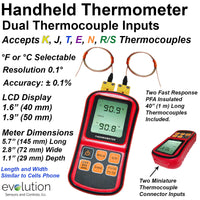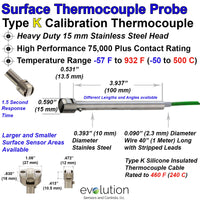Type J Thermocouple Wire - Items tagged as "Fiberglass-insulated-thermocouple-wire-24-gage-solid-900-f-rating"

Type J Thermocouple Wire is one of original thermocouple alloy designs and remains in high regard with extensive utilization in plastics, composite. electronics and chemical product development or processing including medical applications. The SLE grade wire can have exceptional accuracy especially in the 212 to 932°F (100 to 500°C) temperature range along with the ability to work well in vacuum or a reducing atmospheres utilized in these industries.
- Type J thermocouple wire is available in Thermocouple grade, Higher accuracy SLE and Extension grade. The thermocouple and SLE grade wire can be utilized to make the actual thermocouple sensors along with ensuring the millivolt signal is maintained at its highest capable accuracy. Extension grade wire is a good choice when extending the signals over longer distances and or where cost can be a key factor.
- Temperature Operating range of 32 to 1400°F (0 to 760°C).
- Wire Sizes can range from fine diameter 40 gage (0.003") to the very large rugged 14 gage diameter (0.064"), although most applications utilize a narrower range of 30 gage (0.010") to 20 gage (0.032")
- Insulations typically include PVC or Fluoropolymers plastics such as FEP, PFA and Polyimide for temperatures from 32 to 600°F, and Fiberglass or Silica glass fiber for temperature above 600 to 1400°F
- Type J bare thermocouple wire consists of the Positive wire made of Iron and the Negative wire made of Constantan (Nickel Copper alloy)
- ANSI (American National Standard Institute) Color Code for Type J Thermocouple wire is White on the positive wire and Red on the Negative Wire.
- The Positive Iron wire in the Type J thermocouple is susceptible to Corrosion and for the sensor to function properly in wet and or corrosive applications the wire should be completely encased or protected by the plastic insulation.
- Industries and Applications who commonly use Type J are automotive testing, heat treating of aluminum, curing composites, vacuum applications and the overall plastics processing
View all
1000ft
100ft
20-awg-pair
20-gage-thermocouple-wire-with-fiberglass-insulation
20-gage-thermocouple-wire-with-pfa-insulation
200ft
200m
24-awg-pair-056-x-093-inch-dia
24-awg-pair-110-max-inch-dia
24-gage-stranded-thermocouple-and-rtd-wire
25ft
30-gage-010-diameter-thermocouple-wire-with-500f-260c-pfa-insulation
30-gage-bare-wire-sensor-010-inch-diameter
30-gage-thermocouple-wire-with-pfa-insulation
500ft
50ft
EXPP-J-24S
FEP-Insulated-Extension-Grade-Thermocouple-Wire
FF-J-24-1000
FF-J-24S-TWSH-1000
fiberglass-insulated-thermocouple-wire-24-gage-solid-900-f-rating
j
j-calibration-tc-wire
pfa-and-aluminum-mylar-inner-shield-on-j-wire
pfa-and-aluminum-mylar-inner-shield-on-k-wire
pfa-plastic-fluoropolymer-on-j-wire
shielded-thermocouples
solid-wire-twisted
thermocouple-wire-with-stainless-steel-braid
TT-J-24-1000
TT-J-30-1000
Twisted-Shielded-Thermocouple-Wire
type-j-thermocouple-extension-wire
type-j-thermocouple-wire
wire-tc-and-rtd
wire-tc-and-rtd-products








